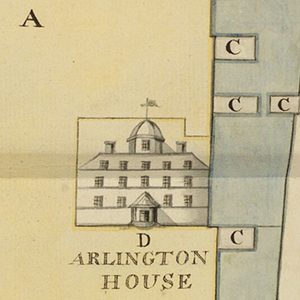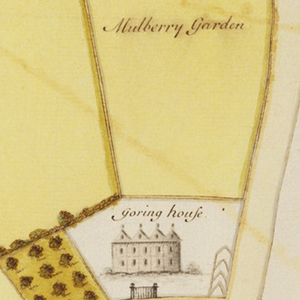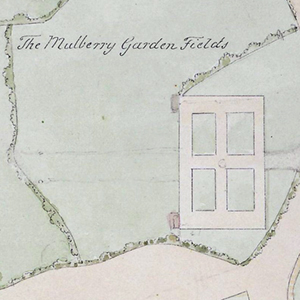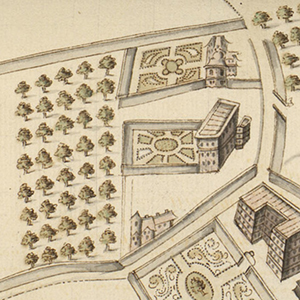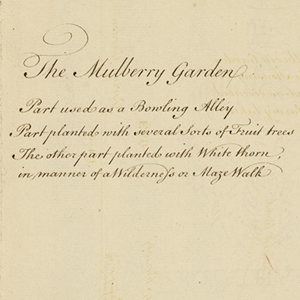Mulberry Gardens
Names
- Mulberry Gardens
- the Mulberry Garden
Street/Area/District
- Mulberry Gardens
Maps & Views
Descriptions
from London Signs, by Bryant Lillywhite (1972)
10605 Mulbery Gardens St. James’s Park c1627–c1680s; 1709–13 [?].
In 1654, John Evelyn mentions the Mulberry Gardens here “now ye only place of refreshment about ye towne for persons of ye best quality to be exceedingly cheated at; Cromwell and his partisans having shut up and seized on Spring Gardens, which till now had been ye usual rendezvous of ye ladys and gallants at this season.”
from London Past and Present: Its History, Associations, and Traditions, by Henry Benjamin Wheatley and Peter Cunningham (1891)
Mulberry Garden (The), a place of public entertamment, temp. Charles I. and Charles II. The subject of a comedy by Sir Charles Sedley, and constantly referred to by the Charles II. dramatists. It occupied the site of the present Buckingham Palace and gardens, and derived its name from a garden of mulberry trees planted by King James I. in 1609, in which year £935 was expended by the King for "embanking a piece of ground and for planting of mulberry trees, near the palace of Westminster."1 James was anxious to introduce the mulberry into general cultivation for the sake of encouraging the manufacture of English silks. It was at this time that Shakespeare planted his mulberry tree at Stratford-on-Avon. Charles I., by letters patent, dated July 17, in the fourth year of his reign, granted to Walter, Lord Aston, on surrender of Jasper Hallenge, "the custody and keeping of the Mulberry Garden near St James's, in the county of Middlesex, and of the mulberries and silkworms there, and of all the houses and buildings to the same garden belonging, for his own and his son's life, or the life of the longest liver."2 The name occurs for the first time in 1627 in the rate-books of the parish of St Martin's-in-the-Fields. Before 1632 Lord Goring purchased the post from Lord Aston for £800, and gave his own name to the residence. The house was then occupied for a time by Speaker Lenthal, while the garden sank into a place of public entertainment. At the Restoration Goring returned to it; and, dying within two years, it was sold by his son and successor to Bennet, the newly created Baron Arlington, who was living here in March 1665, when Evelyn went there and described it as "ill-built, but capable of being made a very pretty villa."' In 1671 the second and last Lord Goring died, and the grounds were demised by Charles II. (September 28, 1673) to Bennet, Earl of Arlington, at a rent of £1 per annum. Goring House, with all its valuable contents, was destroyed by fire September 20, 1674, whilst the family were at Bath. The Mulberry Garden, as a place of entertainment, was closed about the same time. The first writer who mentions this place of entertainment is Evelyn.
May 10, 1654.—My Lady Gerard treated us at Mulberry Garden, now ye only place of refreshment about ye towne for persons of ye best quality to be exceedingly cheated at; Cromwell and his partisans having shut up and seized on Spring Garden, wch till now had been ye usual rendezvous for the ladys and gallants at this season.— Evelyn.
The second is Ludlow, who tells us in his Memoirs that Charles II. violated, "at a debauch in the Mulberry Garden," his own order forbidding the drinking of healths, issued soon after the Restoration. The third is Pepys.
May 20, 1668.—To the Mulberry Garden, where I never was before, and find it a very silly place, worse than Spring Garden, and but little company, only a wilderness here that is somewhat pretty.—Pepys.
April 5, 1669.—To the Mulberry Garden, where Sheres is to treat us with a Spanish Olio, by a cook of his acquaintance that is there, that was with my Lord [Sandwich] in Spain, and ... he did do it and mighty nobly; and the Olio was indeed a very noble dish, such as I never saw better, or any more of. . . . We left other good things that would keep till night, for a collation, and with much content took coach again. ... Meeting The. Turner, Talbot, Batelier and his sister in a coach, we anon took them with us to the Mulberry Garden, and there after a walk, to supper upon what was left at noon, and very good ... and we mighty merry.—Pepys.
The dramatists who refer to it are Sedley, Etherege, Wycherley, and Shadwell. In Sedley's comedy, called The Mulberry Garden, cheesecakes and arbours are alone referred to. Etherege has a scene here, in She Wou'd if She Cou'd, but gives us very little help—he speaks only of "The Cross Walk." Wycherley calls it in one place "Colby's Mulberry Garden;" and the last scene of his Love in a Wood is laid in "the dining-room in Mulberry Garden-house." Shadwell deals in general commendations.
Friske. Once, Madam ! Why does not your Ladyship frequent the Mulberry Garden oft'ner ? I vow we had the pleasantest divertisement there last night
Striker. Ay, I was there, and the Garden was very full, Madam, of gentlemen and ladies, that made love together till twelve o'clock at night.—Shadwell, The Humourists, 4to, 1 67 1.
I remember plain John Dryden (before he paid his court with success to the great), in one uniform cloathing of Norwich drugget. I have eat tarts with him and Madame Reeve at the Mulberry Garden, when our author advanced to a sword and Chedreux wig.—Anonymous Correspondent in Gentleman's Magazine for 1745, p. 99.
The fate of things lies always in the dark;
What Cavalier would know St James's Park?
For Locket's stands where gardens once did spring.
And wild ducks quack where grasshoppers did sing;
A princely palace on that space does rise.
Where Sedley's noble muse found Mulberries.
Dr. King's Art of Cookery, 1709.
A similar garden was established at Chelsea.
I saw at Mr. Gale's a sample of the satin lately made at Chelsea of English silkworms, for the Princess of Wales, which was very rich and beautiful.— Thoresby's Diary, under 1723, vol ii. p. 372.
1 Cal. State Рар., 1603–-1610, р. 562.
2 Augmentation Records, No. 41.
3 August 14, 1660.—"George, Earl of Norwich, for the custody and keeping of the Mulberry Garden."—Register of Requests, 1660–1670; Addit. MS. Brit. Mus. 5759, fol. 26. In a report to the Lords of the Treasury (February 25, 1762) drawn up by the Surveyor-General and the Surveyor-General of the Works, the Mulberry Garden is described as "containing about four acres twenty-two perches, over which stands more than half of Buckingham House, all the northwest wing and other buildings on the north part."—MSS. connected with the sale of Buckingham House, formerly in the late Mr. T. Rodd's possession.
from The Fascination of London: The Strand, by Walter Besant and G.E. Mitton (1903)
[Mulberry Gardens] [Buckingham] palace is partly on the site of the well-known Mulberry Gardens, a place of entertainment in the seventeenth century. These gardens originated in an order of James I., who wished to encourage the rearing of silkworms in England. This project, like many others of the same King, proved a failure, and the gardens were turned into a place of public recreation. The frequenters were of the fashionable classes, and came in the evening to sit in small arbours, and "be regaled with cheesecakes, syllabubs, and wine sweetened with sugar." In this form the place was extremely popular, and is often mentioned in contemporary[ Pg 4] literature. Dryden came there to eat tarts with "Mrs." Anne Reeve, and doubtless Evelyn and Pepys often strolled about in the gay crowd, a crowd much gayer than it would now be—in the matter of costume, at all events. The scene of "The Mulberry Gardens," a play by Sir Charles Sedley (1668) is laid here.
from the Grub Street Project (2006–present)
Rich. Flecknoe's Ænigmatical Characters (1665):
a Dull Countrey Gentleman ... being so miserable, as he grudges at Coach-hire, trembles at the name of Hide Park, Mulberry Garden, and the New Exchange; and never bestows any thing on his Mistris above a Bottle of Ale, or pound of Cherries when they are at cheapest... (80–81)
Pepys' Diary (Wednesday 20 May 1668):
[Creed] and I to White-hall and walked over the park to the Mulberry-garden, where I never was before; and find it a very silly place, worse then Spring-garden, and but little company and those a rascally, whoring, roguing sort of people; only, a wilderness here, that is somewhat pretty, but rude. Did not stay to drink, but walked an hour and so away to Charing Cross and there took coach and away home... —The Diary of Samuel Pepys volume 9, ed. Roberth Latham and William Matthews (University of California Press, 2000), 207.
Pepys' Diary (Monday 5 April 1669):
At noon by appointment comes Mr. Sheres, and he and I to Unthankes, where my wife stays for us in our coach, and Betty Turner with her; and we to the Mulberry-garden, where Sheres is to treat us with a Spanish Oleo by a cook of his acquaintance that is there, that was with my Lord in Spain. And without any other company, he did do it, and mighty nobly; and the Oleo was indeed a very noble dish, such as I never saw better, or any more of. This, and the discourse he did give us of Spain, and description of the Escuriall, was a fine treat. So we left other good things that would keep till night for a collation—and with much content took coach again and went five or six miles towards Branford ... . By the way we overtook Captain Ferrers upon his fine Spanish horse; and he is a fine horse endeed, but not so good, I think, as I have seen some. He did ride by us most of the way, and with us to the park and there left us, where we passed the evening; and meeting The Turner, Talbt., W Batelier and his sister in a coach, we anon took them with us to the Mulberry-garden; and there, after a walk, to supper upon what was left at noon, and very good; only, Mr. Sheres being taken suddenly ill for a while did spoil our mirth; but by and by was well again, and we mighty merry. And so broke up, and left him at Charing-cross... —The Diary of Samuel Pepys volume 9, ed. Roberth Latham and William Matthews (University of California Press, 2000), 509–510.
The maiden-head Lost by moon-light, or, The Adventure of the Meadow, by Joseph Kepple (1672):
perhaps she is more in love with the Gallant, than he with her, who in his apish Apprentiship (for he must be a Slave to her Will) has spent more Money in the Mulberry Garden, and the Parks, than would build an Hospital ...
A Serious Expostulation with E.B. an Eminent Quaker (1673):
we do not run hoiting to the Taverns, and there in a frolique give a nimble-tong'd-Drawer, or his many Ring'd Mistris oportunity to cheat us Nine-pence in the Shilling, but send for the refreshing Bottles home, and tope them off in secret: And then as for our more private pleasures, no Men in the world can have them better cheap; we are ne'r put to the charge of Coach, Sedans, Plays, Masks; Masqueradings, running to the Park, Spring-Garden, Mulberry-Garden, or Exchange; we have no Rich Gowns, tempting Petticoats, Necklaces, Lockits, Points of Flanders or Venice; not so much as Gloves, fine Knots, or an extraordinary Treat, to draw our purses before one can expect a kindness, as those vain Sons of Belial, the Town-Gallants, Vassails of Satan, and Bond-slaves to Lusts, are forced to bestow on the painted Jezabels they call Mistresses ... (6)
The Country Wife, by William Wycherly (1675):
Mrs. Pinchwife
Pray, Sister, where are the best Fields and Woods, to walk in in London?Alithea
A pretty Question; why, Sister! Mulberry Garden, and St. James's Park; and for close walks the New Exchange....
Mr. Pinchwife
Hark you Mistriss, do not talk so before my Wife, the innocent liberty of the Town!Alithea
Why, pray, who boasts of any intrigue with me? what Lampoon has made my name notorious? what ill Women frequent my Lodgings? I keep no Company with any Women of scandalous reputations.Mr. Pinchwife
No, you keep the Men of scandalous reputations Company.Alithea
Where? wou'd you not have me civil? answer'em in a Box at the Plays? in the drawing room at Whitehal? in St. James's Park? Mulberry-garden? or—Mr. Pinchwife
Hold, hold, do not teach my Wife, where the Men are to be found; I believe she's the worse for your Town documents already; I bid you keep her in ignorance as I do.
See Mulberry Garden.
